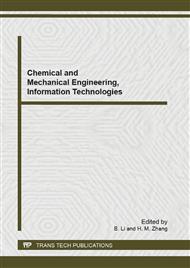p.1096
p.1100
p.1105
p.1109
p.1113
p.1117
p.1121
p.1125
p.1130
A Simulated Annealing Based Algorithm for Energy-Constrained Ferry Route Design Problem
Abstract:
Message ferry is a controllable mobile node equipped with long distance communication antennas and rechargeable energy, to collect data in sparse wireless networks and delivery it to the base station. The Energy-Constrained Ferry Route Design (ECFRD) Problem aims to schedule the ferry route when the energy of the ferry is not sufficient to access all the nodes in the network in one tour without charging, so as to minimize the total route length of the ferry. In this paper, we propose a simulated annealing based algorithm to solve the ECFRD problem. The experimental results show that the algorithm proposed in this paper can greatly reduce the total route length of the ferry, comparing the classic nearest neighbor algorithm.
Info:
Periodical:
Pages:
1113-1116
Citation:
Online since:
September 2013
Authors:
Price:
Сopyright:
© 2013 Trans Tech Publications Ltd. All Rights Reserved
Share:
Citation:


